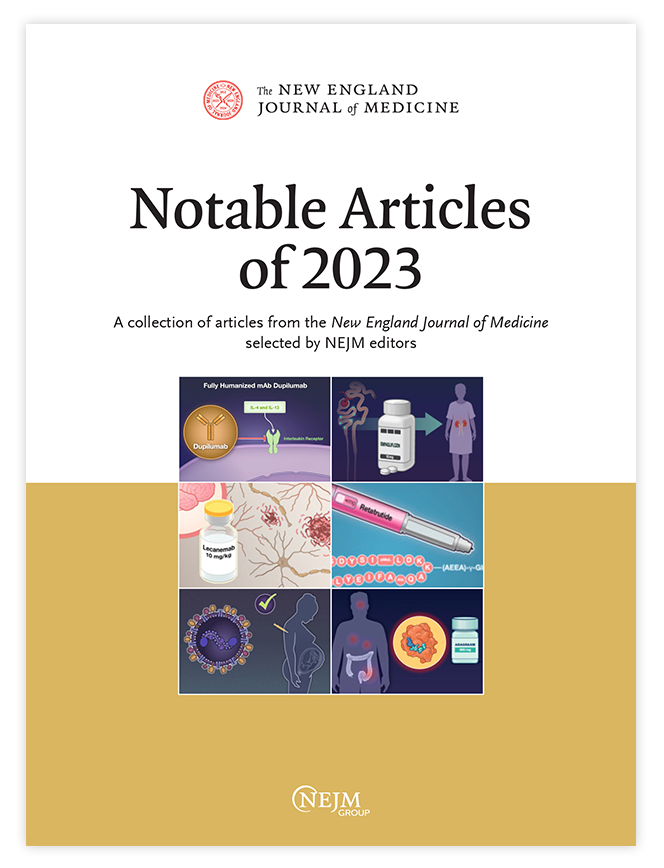Nonoperative Management of Mismatch Repair-Deficient Tumors.
IF 96.2
1区 医学
Q1 MEDICINE, GENERAL & INTERNAL
引用次数: 0
Abstract
BACKGROUND Among patients with mismatch repair-deficient (dMMR), locally advanced rectal cancer, neoadjuvant checkpoint blockade eliminated the need for surgery in a high proportion of patients. Whether this approach can be extended to all early-stage dMMR solid tumors, regardless of tumor site, is unknown. METHODS We conducted a phase 2 study in which patients with stage I, II, or III dMMR solid tumors that were amenable to curative-intent surgery were treated with neoadjuvant dostarlimab, a programmed cell death 1 (PD-1) blocking agent, for 6 months. The response to treatment was assessed in two cohorts: patients in cohort 1 had dMMR, locally advanced rectal cancer, and patients in cohort 2 had dMMR nonrectal solid tumors. Patients with a clinical complete response could elect to proceed with nonoperative management; those with residual disease were to undergo resection. In this analysis, the primary end point, assessed in cohort 1, was a sustained clinical complete response at 12 months. Recurrence-free survival and safety were evaluated. RESULTS A total of 117 patients were included in the analysis. In cohort 1, all 49 patients who completed treatment had a clinical complete response and elected to proceed with nonoperative management. A total of 37 patients had a sustained clinical complete response at 12 months, a finding that met the criterion for efficacy. In cohort 2, a total of 35 of 54 patients who completed treatment had a clinical complete response, and 33 elected to proceed with nonoperative management. Among the 103 patients who completed treatment across both cohorts, 84 had a clinical complete response, and 82 did not undergo surgery. Among the 117 total patients, recurrence-free survival at 2 years was 92% (95% confidence interval, 86 to 99); the median follow-up for recurrence was 20.0 months (range, 0 to 60.8). The majority of patients (95%) had reversible, grade 1 or 2 adverse events (60%) or had no adverse events (35%). The option for curative resection was not compromised during or after treatment in any of the patients. CONCLUSIONS Among patients with early-stage dMMR solid tumors that were amenable to curative-intent surgery, neoadjuvant PD-1 blockade led to organ preservation in a high proportion of patients. (Funded by Swim Across America and others; ClinicalTrials.gov number, NCT04165772.).错配修复缺陷肿瘤的非手术治疗。
背景:在错配修复缺陷(dMMR)、局部晚期直肠癌患者中,新辅助检查点阻断消除了大部分患者的手术需求。该方法是否可以推广到所有早期dMMR实体瘤,无论肿瘤部位如何,目前尚不清楚。方法:我们进行了一项2期研究,在该研究中,适用于治愈意图手术的I、II或III期dMMR实体瘤患者接受新辅助dostarlimab(一种程序性细胞死亡1 (PD-1)阻断剂)治疗6个月。对治疗的反应分为两个队列进行评估:队列1患者患有dMMR,局部晚期直肠癌,队列2患者患有dMMR非直肠实体瘤。临床完全缓解的患者可以选择继续非手术治疗;有残余病变者行切除。在该分析中,在队列1中评估的主要终点是12个月时的持续临床完全缓解。评估无复发生存期和安全性。结果共纳入117例患者。在队列1中,所有49名完成治疗的患者均有临床完全缓解,并选择继续进行非手术治疗。总共有37名患者在12个月时有持续的临床完全缓解,这一发现符合疗效标准。在队列2中,54例完成治疗的患者中有35例临床完全缓解,33例选择继续非手术治疗。在两个队列中完成治疗的103例患者中,84例临床完全缓解,82例未接受手术。在117例患者中,2年无复发生存率为92%(95%可信区间,86 - 99);复发的中位随访时间为20.0个月(范围0 ~ 60.8个月)。大多数患者(95%)有可逆的1级或2级不良事件(60%)或无不良事件(35%)。在任何患者的治疗期间或治疗后,治疗性切除的选择都没有受到损害。结论:在早期dMMR实体瘤患者中,新辅助PD-1阻断导致了高比例的患者器官保存。(由Swim Across America和其他机构资助;ClinicalTrials.gov号码:NCT04165772)。
本文章由计算机程序翻译,如有差异,请以英文原文为准。
求助全文
约1分钟内获得全文
求助全文
来源期刊

New England Journal of Medicine
医学-医学:内科
CiteScore
145.40
自引率
0.60%
发文量
1839
审稿时长
1 months
期刊介绍:
The New England Journal of Medicine (NEJM) stands as the foremost medical journal and website worldwide. With an impressive history spanning over two centuries, NEJM boasts a consistent publication of superb, peer-reviewed research and engaging clinical content. Our primary objective revolves around delivering high-caliber information and findings at the juncture of biomedical science and clinical practice. We strive to present this knowledge in formats that are not only comprehensible but also hold practical value, effectively influencing healthcare practices and ultimately enhancing patient outcomes.
 求助内容:
求助内容: 应助结果提醒方式:
应助结果提醒方式:


